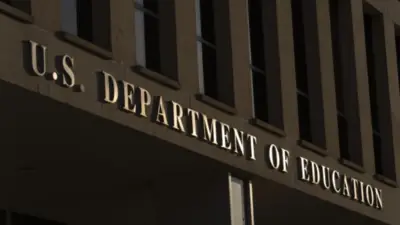Justice on mute: As the Education Department withers, thousands of children wait in vain

[ad_1]
It started like every formal complaint: with hope. Adrienne Hazel, a mother from Southfield, Michigan, submitted a report to the US Department of Education in April after her 20-year-old son Ricky, who has autism, was placed in a public school programme without a certified teacher and denied an individual learning plan. She received an automated reply. Then, silence.Last year, her complaint had triggered a response within weeks. “The office notified Ricky’s school,” Hazel recalled, “which spurred the district to reach an agreement with her within about three months.” This time? “There has been zero response to this,” she said to The Associated Press. “He’s basically going into a babysitting situation. He’s not getting the things that he needs to grow into independence. And he’ll just be aging without getting an education.”Her story is not unique, but it is increasingly common.
Dismantling in motion : Fewer hands, heavier burden
The Trump administration has maintained that it is committed to protecting the civil rights of American students, even as it proceeds to dismantle the very institution created for that purpose. In March, the Office for Civil Rights (OCR) at the US Department of Education lost nearly half of its staff to mass layoffs. In the words of Education Secretary Linda McMahon:“Not only are we reducing the backlog, but we are keeping up with the current amount with a reduced staff because we are doing it efficiently,” as reported by the Associated Press. Yet internal data and public records tell a different story. So far this year, OCR has reported just 65 resolution agreements, a pace far below the 380 logged in 2024 and the 561 in 2023. During Trump’s first term, the office averaged more than 800 resolutions annually, with a high of 1,300 in 2017.According to internal data obtained by the Associated Press, total resolved cases, whether dismissed, mediated, or voluntarily resolved, have dropped 40% compared to the same time frame last year. Even more troubling, cases resolved through actual compliance agreements or legal action have decreased by 70%.Meanwhile, complaints are climbing, up 9%, with the total backlog now exceeding 25,000.
A promise repackaged as reform
Despite the decline in resolution output, the Department of Education insists it is cleaning up what it calls an inherited bureaucratic disaster.“When staff levels were at their peak, OCR’s processes still proved to be ineffective,” spokesperson Julie Hartman said to Associated Press, “as evidenced by the chronic backlog of tens of thousands of cases that left students’ discrimination claims languishing over many presidential administrations.”But for parents waiting for action, this narrative feels like an excuse. Their children’s lives are on hold, not because of inefficiency, but because of silence.
When the system stops responding
Marcie Lipsitt, a veteran special education advocate in Michigan, is watching a grim pattern emerge. She helps families file complaints, but she no longer offers optimism. Investigations, she warns, now take at least a year, if they begin at all.“Some schools have backtracked on previous agreements,” she said, as reported by the Associated Press. “Yet parents can’t get a response from the federal office.”And while parents wait, schools become more emboldened, reversing prior commitments and skirting their legal obligations.
An office gutted, a nation on edge
OCR once stood as a shield for students who had no other avenue to pursue justice. Now, it’s barely standing. Over 200 employees remain on leave as part of a federal lawsuit over the March layoffs. A June court order temporarily paused further terminations, with a federal judge in Boston stating that OCR is “currently incapable of addressing the vast majority” of complaints.And yet, McMahon continues to claim progress: She told senators in June that the office was making headway after inheriting a backlog of 20,000 cases from the Biden administration.Still, doubts grow. With reduced staff and increased complaints, remaining OCR employees report unsustainable caseloads. Last year’s budget indicated that investigators managed an average of 42 cases each. Now, insiders suggest the figure exceeds 200, a number that renders meaningful investigation nearly impossible.
Redefining civil rights by narrowing its scope
Of the few cases OCR has resolved in 2025, most focus on disability discrimination. Smaller numbers involve sex or race. Among the sex discrimination cases, a noticeable share deals with restricting transgender athletes from women’s sports, a central plank of Trump’s campaign rhetoric.Hartman defends the office’s direction: “OCR will continue to meet its statutory responsibilities while driving to improve efficiency and resolve the longstanding backlog,” she said to Associated Press.But parents like Casie Clouse are still waiting. Her 14-year-old son Brady, who is blind in one eye and has a learning disability, was promised accommodations: Access to teachers’ notes, reduced coursework, and a supportive plan. He received none of it.“He is going to go to high school and fail,” she said. “I feel like my child will not get a high school diploma if he stays in Ann Arbor Public Schools,” as reported by the Associated Press. She filed her complaint in May. She’s yet to hear a word back.
A system designed to respond, now refusing to answer
Civil rights enforcement in American education was never perfect, but it was, at the very least, visible. It gave families a sense that somewhere, someone might listen. Now, as the Department of Education is slowly dismantled and responsibilities are eyed for outsourcing to the Department of Justice, the last layer of federal protection appears to be fading.For parents of children with disabilities, for students facing discrimination based on race or gender identity, the silence is more than a delay, it’s a denial.When a system stops answering the most urgent cries of its youngest and most vulnerable, the question is no longer one of efficiency or politics.It is one of abandonment.
[ad_2]
Source link






